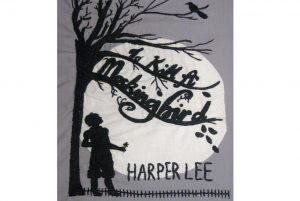‘To Kill a Mockingbird’ shouldn’t be removed from any curriculum
“Until I feared I would lose it, I never loved to read. One does not love breathing.”
This is one of the many quotes Harper Lee wrote in “To Kill a Mockingbird.” A classic novel about Atticus Finch, a white lawyer, defending Tom Robinson, a black man, against rape charges. The book exposes stereotyping and racism that were evident during the 1930s.
Now — regarding that quote that Scout Finch said in the novel — that fear of losing the right and ability to read will be a reality regarding this novel for some students.

“To Kill a Mockingbird” was written by Harper Lee and published in 1960.
The Biloxi (Miss.) school district dropped “To Kill a Mockingbird” from the eighth-grade curriculum.
Columnist Leonard Pitts Jr., of the Miami Herald, quoted Kenny Holloway, one of the school board officials in Biloxi, as saying, “There is some language in the book that makes people uncomfortable.”
Pitts’ column was published in the Detroit Free Press.
I completely agree with Pitts when he wrote that we are a nation “where some educational institutions now deem it their duty to offer ‘safe spaces’ and ‘trigger warnings’ to protect their students from vexatious language.”
The novel took place in the South during the Great Depression. During the Great Depression black people suffered many hardships.
Racism was painfully evident during this time as black people were discriminated against and fired from the scarce jobs available because of their skin color.
The novel accurately depicts the diction that was used during this time. Yes, it was offensive, that’s the point. The language was angry and cruel. Even a character in the novel, Atticus, told his daughter that people’s language toward different races was “ignorant.”
Mrs. Cindy Sierra, English teacher, enjoys teaching “To Kill A Mockingbird” to her freshman students. She said there are many “strong messages and literary teaching points.”
“‘To Kill A Mockingbird’ touches on how perceptions shape reality, especially in a small town and on growing up and losing the naïve blinders of childhood. Most importantly, the book shines a light on a history of racial inequality in America,” Sierra said. “In the text, race shapes the fate of the characters more than truth, more than socio-economic status, and certainly more than quality of character.
“Even with this injustice, the message is that this is not the way America should be, and that every man and woman has the opportunity and responsibility to stand up for what is right — even when the outcome is doubtful.”
To change the language in the book would be to change history. We use history — especially United States history — to learn and grow. Segregation and racism was a huge part of the 1930s and America’s history as a whole. It was the way people lived. Obviously, people know this and fought against it — and still continue to fight against it today.
The offensive language in the text is supposed to make readers angry, the racism toward Tom Robinson is supposed to make readers angry, and the clear bias of courts against the black man is supposed to make readers angry, just like it made Atticus angry. Anger leads to action and action, in due time, leads to change.
To not teach students about history, especially the awful, offensive, sad, and angering history, is simply un-American.
What’s next? The white man didn’t call Rosa Parks nasty names and she simply sat down on the bus for the heck of it? The National Association for the Advancement of Colored People fights for rights they already have?
No. That’s not how it is, and that’s not how people should think it is. We should be honoring their fight, not hiding it or covering it up.
“Uncomfortable.”
The language in the book is “uncomfortable,” Holloway said.
It’s a lot more than that.
It’s hurtful, angering, sadistic, and that’s exactly how Lee wanted it to be.
Racial slurs and comments should be uncomfortable — the moment they aren’t is when society will be doomed.
Sierra believes this novel left an impact on readers and continues to be an influence on society.
“The book remains relevant and impactful. It continues to be alluded to in movies and other books,” Sierra said. “The strong messages of the value of a person, true integrity, and the premise that the American court system should be the great equalizer of men still ring true as ideals we hope to see in our country.
“There is also a strong call for working to understand one another. The enduring theme of the book was even quoted by President Obama in his exit speech, ‘You never really understand a person until you consider things from his point of view. Until you climb into his skin and walk around in it.’ We all can learn a lot from reading ‘To Kill A Mockingbird.'”
The featured image in this story is from flickr.

Birthday: Oct. 26, 2000
Hobbies/Interest: Playing electric, acoustic, and bass guitar, as well as ukulele. I also enjoy drawing, reading, writing,...






